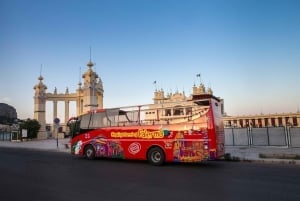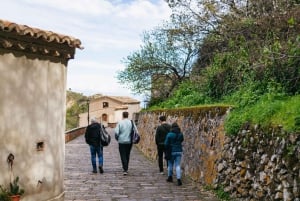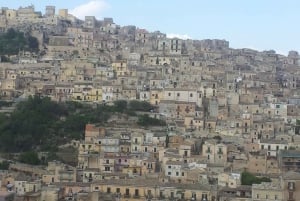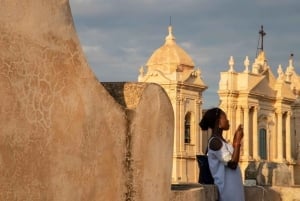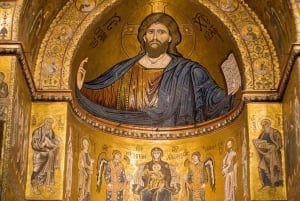Legends of Sicily
The Legend of Sicily
This legend dates from the Byzantine rule and is called the Legend of Sicily. It was born to give an explanation to the island's name Sicily (its ancient name was Trinacria - land of the three capes). It tells the story of a beautiful Lebanese princess, whose name was Sicily. An oracle had predicted that before she became 15 years old she was to leave her country alone in a boat, and if she did not do so she would end up in the jaws of the monster “Greek-east” that would have appeared under the terrible form of the cat-monster. To avoid this terrible fate, upon the completion of the fifteenth year of age of the princess, her parents, crying and desperate with pain, put her in a boat and entrusted it to the waves. After three months adrift at sea the poor princess Sicily believed that her life had come to an end, since there was no more food or water. Her boat was taken by good winds upon a gorgeous beach at the slopes of Etna – this beach consisted of lumps lava and golden sand, full of flowers and fruits, but completely deserted and lonely. The young princess was in despair and cried until she no longer had tears, when suddenly a young beautiful man appears next to hear, to give her comfort and love. The young boy explained that the islanders had all died of plague, and that fate had chosen him and princess Sicily to repopulate the island with a stronger and kinder breed.
Just him and her, two young and beautiful humans,,, things could not have turned out better, and you can imagine how happy they were. Sicily did indeed marry this young man, who was really capable and brave, with the looks of a true knight.
Being now king of the entire kingdom, a kingdom filled with so many treasures and with all that that land was producing, he was glad and esteemed Sicily as the apple of his eye. Because of this he wished to call their land Sicily, and this has been its’ name ever since then.
Carridi (Charybdis)
Charybdis was a sea monster in Greek mythology. In the beginning, Charybdis was a woman, daughter of Poseidon and Gaia, a great thief famous for her voracity.
One day she stole the bulls of Geryon from Heracles, she ate a few of them. Zeus got mad and struck her with lightning so that she fell into the sea, he there turned her into a monster, with the shape of a whirlpool. This monster was able to swallow all the ships that passed by. Charybdis was placed where we today find the harbour of Messina, on the other side of the Strait of Messina there was the monster Scylla. All the ships had to pass by close to either of these two monsters. There are indeed whirlpools in the Strait of Messina because sea currents, but not very relevant.
Legend has it that only the Argonauts (a band of heroes) managed to get by without losing their lives to one of these monsters, thanks to the protection of Thetis, mother of Achilles and one of the Nereids.
Colapesce
There is a legend regarding a young man named Nicola, called Cola. He was the son of a fisherman from Messina, and they called him Colapesce (“Cola the fish”) because of his extreme ability to go under water.
Every time that Cola the fish came home from one of his adventures under the sea he would tell of all wonderful things he had seen, and once he even brought home a treasure.
When the King of Sicily, Emperor Fredrick II, heard of the ability of this young man he decided to put him to the test. The King and his court went out at sea on a boat, the King then threw a goblin into the water. Cola the fish dived and brought back the goblin. The King then threw his crown into the water, in a place where the water was even deeper, and Cola the fish dived and brought back the crown too. The third time the King decided to throw one of his rings in a place where the water was even deeper, Cola the fish dived in, time went by, Cola the fish never surfaced.
Legend has it that Cola the fish went so deep that he discovered that Sicily was held by three columns, and he saw that one of these was about to crumble. Cola the fish then decided to stay under water and hold this column so that Sicily wouldn’t go under. Cola the fish is still down there, holding the island of Sicily.
The Legend of the Alcantara River
Once upon a time, the Alcantara river was a quiet river, it ran calmly in its placid bed, there were no tosses, rapids or jumps. Thanks to the river the whole valley was fertile. Only the men were evil: they harmed each other and did not respect nature.
In the valley lived two brothers, together they grew wheat in a field. One of the two was blind.
When it was time to split the crop the healthy brother was supposed to split equally – one bucketful for him and one for his brother. The healthy brother got wicked and decided to split so that most of the crop became his. An eagle was flying over them, it saw everything and told what he had seen to the Lord. The Lord got furious and struck the cheating brother with lightning and killed him.
This lightning also struck the huge part of the crop that the evil brother had put away for himself, and this pile of wheat turned into a red mountain, out of which came a red river of lava that found its way through the valley and down to the sea.
When Neptune saw this river of lava about to reach the water he stopped it with his hands – the precise point was in Giardini-Naxos, and on the lava-rocks there is today a sculpture representing the wings of victory Nike. Since Neptune had stopped the river of lava it had nowhere to go, and so an abyss opened up in the valley of Alcantara and all the lava was sucked down.
The lava that remained on the walls of the abyss cooled and became hard as steel – theses walls are the Gorges of Alcantara.
The Cyclops
The inhabitants of Castelmola have their own theory about how their town was founded. According to a legend the town-walls were built by no other than Ham, son of Noah, after having managed to send away his brother Japheth from Sicily. The town belong to the descendants of Ham and his people from that moment.
The Cyclops that lived around Mount Etna loved to stroll in these hills, and it surely didn’t take them long to get here. A beautiful walk in the middle of hills and sea, and they would often grab the peak of a hill and use them as benches to sit on, to be able to admire the beauty of nature and rest their tired bodies. The Cyclops had another hobby: they would compete at throwing hill-peaks into the sea, all along the Ionian coast, in order to create more beauty along bays and beaches. The waves would hit these rocks, surrounded by a crystal sea.
Legend has it that Cape “Sant’Andrea”, between Mazzarò and Isola Bella, was made of the peak of Mount Ziretto, thrown down just for fun by a Cyclops.
I Lupinari
The inhabitants of Castelmola have their own theory about how their town was founded. The “lupinari” were terrible sorcerers who lived in the borough of Luppineria. Every full moon , they poured into the streets of Castelmola sowing terror and fear. The particularity of these lupinari was that they transformed themselves from human beings into porks and in order to make them turn human again(man or woman) people had to prick them with a blessed nail called “ugghiata“, (taken from a rod of chestnut two meters high), used by villains. These sorcerers lived in the cabin of the big oak and near Giulio Pizzo on Mount Lapa.
It is said that on a full moon in summer two local farmers met the sorcerers at “Pietra Iudio” and they got so scared that they died a couple of days later, after having told their families about the scary encounter.
This legend remains in stories told by the elder, even if it is slowly being erased from popular memory.
La leggenda del Castagno dei Cento Cavalli
The chestnut tree of the one hundred horses is the largest and oldest known chestnut tree in the world.
It is generally believed to be 2,000 to 4,000 years old. It is located in Sant’Alfio, near Mount Etna.
The tree’s name originated from a legend:
A Queen was out hunting with a hundred knights and some chaperones. The company was surprised by a violent thunderstorm when they where close to a giant chestnut tree, so they escaped the tempest by hiding under the branches of this tree. Sunset came and the thunderstorm wouldn’t stop, so the Queen passed the night under the tree, legend has it that she spent the night with some lovers chosen among the hundred knights.
There is no way to know for sure who this queen was, but some say it had to be Joanna I of Aragon, others say it had to have been Joanna of Anjou, and in this way the queen’s night with lovers was contributed to the insurrection of the Vespers (during the 13th century). All of this is probably just another legend invented by people. For example, Queen Joanna of Anjou, although widely known for her love affairs, almost certainly never came to Sicily.
Le Sirene di Sirina
Below the hill of Mola runs a small river that ends in the sea. This small river is called Sirina or Sifone (this second name comes from the sound made by the water). The mostly used name, Sirina, comes from the fact that the beauty and the echoes of this river made the inhabitants of Castelmola think that mermaids lived there.
These popular beliefs created a legend:
“Down in the valley, in the middle of the rocks of Castelmola, the hill of “Mastrissa” and of “Curria”, murmurs the river Sirina, the biggest spring in the area.
It is a night of full moon. The water sparkles of silver, the shadows have a tremor of mystery.
A sweet chant rises, soft, nostalgic.
There comes: down from the emerald caves, a strange group, producing a melodic harmony of many voices, melody that reaches all the boroughs and the town of Castelmola.
Just like in the town of Hamelin, attracted by the sound of the magic piffero all the children went out in the streets to follow the mysterious stranger, who would lead them beyond the hill, taking them to another life, but far away from their families, just like them all the beautiful young men and women of Castelmola went down to this dreamy paradise.
No one remembers their return: transformed into mermaids, and went on to live, or die, in that enchanting place.
Every night the melody of the mermaids renews, with the sound of the water and the chants of numerous nightingales that came from far away in the month of April.
Aci and Galatea
An ancient Greek legend tells that Neptune, god of the sea, when running one day on the sea, riding on the back of a dolphin, saw a beautiful island, an immense gulf of beauty, enclosed by two rivers, one of which was just a stream, all with a background that was very impressive: a volcano, beautiful, snowy, and its slopes full of jagged lava, forests and caves. It was Sicily, and the god was so pleased that he made all of his children come out of the sea and sent them to live on this island.
They were gigantic creatures with one eye placed in the middle of the forehead, and they were called Cyclops. The Cyclopes lived in Sicily, grazing flocks of sheep and goats. They were good shepherds, and taught men to make butter and cheese.
But Neptune in his wanderings soon forgot about them.
These Cyclops, though they were the sons of gods, with the passing of time, having been abandoned on this wonderful island, became increasingly rude and bad.
.. each commanded their children and wives, regardless of each other .. there were no meetings or counsels, no law ..
Two of these especially tried to overwhelm the others, and their names were Polyphemus and Bronte. Each of these two had been able to obtain the largest and most beautiful cave, and the largest flocks of goats and sheep.
At dawn of every new day they sat upon the slopes of Mount Etna in search of good pastures for their herds, and when they found it they exalted with joy, grumbling and slamming their fists on the ground or against the rocks, shaking the whole mountain .
Acis, son of Faunus and a the nymph Simeto, fell madly in love with the nymph Galatea.
Galatea was poor and desperate because she was a nymph loved by the Cyclop Polyphemus, who was ugly and crude, and aroused enormous fear with his unique and terrible fiery eye. This eye radiated the hatred and fear in his heart from his forehead. Polyphemuses favourite waste of time was to bring fear and terror to the people he met on his stroll with the sheep, and when he was lounging with his friend Bronte, on the hillside of Mount Ziretto around Castelmola, when they spotted fishing boats or ships they would aim and throw huge rocks. They would both rejoice, grumbling of their evil deeds. (In particular, Polyphemus and Bronte were mad at Teocle and Ulysses was angry at one Teocle and one called Ulysses – Polyphemus in the future would have known Ulysses by the name of Nobody)
But for the love of Galatea Polyphemus stopped seeing Bronte and would no more throw rocks at ships sailing along the coast.
One day the Cyclops, filled with excitement to see his beloved Galatea, began looking for her in the forests around Mount Etna, which he knew very well.
Huge was his anger when he saw from afar his beloved Galatea in the arms of Acis. Out of his throat came a horrible roar.
He uprooted dozens of trees his powerful hands, took them and threw them against them. Full of anger began to beat with his fists on a large boulder, and the upheaval shook the whole mountain.
Galatea got frightened and dove under water in the nearby sea, but the Cyclops Polyphemus, blinded with jealousy, picked up a huge rock and threw it on Acis, crushing and killing him.
The body of the poor shepherd boy was there, under the rock without a flicker of life.
As soon as the news reached Galatea she realized that it was the body of Acis. At the sight of her beloved one, she cried all the tears that she had in her body. Galatea awakened the compassion of the gods, and they wanted to relieve her sorrow, so they transformed Acis into a beautiful river that runs from Etna down to the beach where the two lovers used to meet.
The gods had transformed the blood coming out of the body of the dying Acis into water, that would turn into a river. Thus the two lovers reunite, and when the waves meet from the slopes of Etna to the sea, it seems to hear the sweet melody of the innocent.
Not far from the primary road, near the current fishing village of Cape Mills, renowned for its restaurants with fish and shellfish, a few kilometers from Acireale, there is a small spring that locals call “the Spring of the blood of Acis” because of its red colour.
Ulysses and Polyphemus
Ulysses, king of Ithaca, a Greek island, in his pilgrimage with his twelve ships in the Mediterranean sea, met the wrath of Zeus who had unleashed another storm, and Odysseus and his men were so tossed about that they lost the notion of time and not were not able to focus anymore. So when they saw a large, green island dotted with rocks and inlets created by prehistoric lava flows and a volcano that spit fire, smoke and incandescent stones, but white with snow and beautifully looking, well-fed sheep on its’ lower slopes – at this view they jumped for joy. But they did not know that this was Sicily, the land of the Cyclops.
On the island of Sicily, near the volcano Etna, lived seven brothers and they were all gigantic and terrible. Only the names of four of them were known: Bronte – Sterope – Arge and Polyphemus. Polyphemus was the eldest and the most monstrous, he was particularly fond of his brother Bronte. These seven brothers were the sons of Poseidon and they belonged to the breed of the Cyclops – they had one single big eye in the middle of the forehead. They all lived on sheep-farming, and they were rude and nasty villains. Every time they saw some ships at the horizon they would hide to spy on the ships with their single eye – their eyes were filled with red veins and emanated all the hatred and malice that they felt towards humans, and the mere thought of meeting them was enough to scare anyone. When the ships came within shooting-distance the Cyclops took aim and began throwing stones and big boulders, but since they only had a single eye the Cyclops did not score very often. But when they managed to score they got so excited that they would beat, with all the superhuman power they had, their fists on the ground causing terrible quivers and sounds of explosion throughout the island. Polyphemus was grazing his flock when Ulysses and his comrades arrived at his enormous cavern, and since these visitors believed in the hospitality of the Cyclops, they brought a lot of wine as a gift and they waited for Polyphemus to return. Suddenly they heard a roar and heavy footsteps that shook the rocks. Terrified, the visitors hid behind a big boulder in the cavern. A scary looking giant arrived, he crouched at the entrance and croaked ”Come here, my flocks. Come to Polyphemus to be milked. ” Ulysses jumped. He had heard of Polyphemus and the Cyclops and knew that they were in trouble. Indeed, the Cyclops do not work the land “.. trusting in the immortal .. “they do not know how to navigate, they do not live in larger groups but only with their small family” .. each command their children and wives, regardless of each other .. “.. They have no assemblies of counsel, no law ..” When Polyphemus was done milking he lit a fire, and it was not until the flames became tall and bright that he noticed the twelve men hiding behind the boulder. Polyphemus roared with anger: “Foreigners, sheep thieves! I will tear you into pieces and eat you for dinner!”. At these terrible words, some of the twelve visitors died of fright. One moment later Polyphemus grabbed two of the men and put them in his mouth, grinding them with his sharp teeth. Then, having rolled a large boulder in front of the entrance of the cave, he lay down to sleep. While his snoring echoed between the walls, Ulysses tried to devise a plan. But he remembered nothing. So, the next morning, the giant took two other men and devoured them as he had done with the first two. After that Polyphemus went out of the cave with all of his sheep and again put the boulder in front of the entrance. They were trapped! Ulysses observed a log thrown on the ground, and got an idea. He sharpened the log until it became a long sharp pole. They were all hiding when Polyphemus returned. Just like the night before, Polyphemus milked his sheep and devoured two other men. Then he made a mighty belch, and after having rolled the boulder in front of the entrance he lay down on the ground. But this time he did not fall asleep immediately, and Ulysses jumped out to talk to him: “Cyclop, oh Cyclop, perhaps you would like some wine, ruby-red, after such a big meal of meat. Everyone knows that red wine goes well with a large piece of meat oh big Cyclop”. (and here comes to mind the first sommelier of the story) This way you will know what kind of beverage that we brought on our ships, said Ulysses shyly with a lump in his throat thinking of all the men that he had lost. Polyphemus replied ”How dare you advise me what to do, and who are you?” And Ulysses answered, well aware of the fact that he could not tell the truth: my name is “Nobody ” and I am the leader of these helpless men that by mistake came to disturb you.” Polyphemus hesitated for a moment, and remained suspicious of this confidence. The fire had by now spread a nice warmth in the cave, and Polyphemus held out his huge hands to warm them. “Well done,” he said. “You men are really small and insignificant creatures, but you have lit a nice fire.” Ulysses pretended to be grateful. “We just want to serve you, great Polyphemus,”. Ulysses gave Polyphemus a bowl of wine, and the Cyclop drank all of the sweet drink, and then said: ‘Give me more, boy. Tell me again your name, because I want to give you the gift of hospitality. We Cyclops also produce wine, but you wine is pure nectar and ambrosia”. Ulysses said: “Cyclop, you ask me again for my name, and I’ll tell you: you give me, as you promised, the gift of hospitality. Nobody is my name: Nobody is what my mother and father call me, and Nobody is what all the other comrades call me, and I am the leader of the men who were lost due to the storm. ” ” Well (said the Cyclop) the gift that I will give to you is that I will eat you last of all”. When the monster collapsed after getting drunk by drinking the sweet nectar that Ulysses gave him. When all seemed quiet in the cavern, Ulysses and then his men took the big sharpened log and put it into the fire, and when it was well heated they grabbed it together and stuck it in the eye of the Cyclop. Polyphemus made a terrible scream that shook the whole mountain. The Cyclop then pressed his hands on his eye, shouting and roaring to the point that the Greek visitors almost became deaf. “Why is it so dark?” Polyphemus roared. “I do not see anything,”. Polyphemus began to feel the walls and the floor of the cave, searching for Ulysses and his comrades. His huge fingers kept hitting the ground near them: the fingers were big enough to crush them. Ulysses ran toward the pile of sheepskins. Quickly he threw one to each partner. “Cover up and get on all four” , he said. “Then crawl towards the entrance”. Quickly the Greek did as Ulysses said. Suddenly he felt the fingers of the Cyclop touching the sheepskin that covered his back: they had a huge weight. Polyphemus then touched the skin of a sheep, then another and another. Under each of them there was a Greek. “They ran away” he roared. “Those clever rascals! They blinded me and fled. Only the sheep are left in this cave!”. As fast as they could, Ulysses and his men crawled out of the cave. Once outside, they The faster they could, Ulysses and his companions came crawling from the cave. Once outside, they took off the sheepskins that had saved their lives and ran towards the beach. “The ship is too damaged to sail”, Ulysses immediately said. “But the boats are fine. Hurry! Put them in the water and lets go away from this island. In the meantime, the brothers of Polyphemus heard the dreadful cries and went to the cave to try to find out what had happened. But since they knew Polyphemus’ temper, no one had the courage to ask. Finally Bronte, his favourite brother, asked: “Polyphemus what happened? Why are you shouting and screaming so loud? “. Polyphemus answered: “It was Nobody”. The Cyclops looked at each other not knowing what he meant, and again on the advice of the others Bronte asked: ”Why do you scream and cry, what happened to you? ” and Polyphemus replied: “It was Nobody, Nobody blinded me, and Nobody with his men ran away!”. Now the cyclops felt mocked, they turned around and left. Ulysses and his six remaining comrades , using the sails and the oars, reached the ships that the crew had already prepared and they quickly sailed away, leaving the coast behind them.
Meanwhile, Polyphemus, who imagined what had happened, tried as he could to reach the fugitives, but since he was blinded he could not catch the fugitives in time. The boats were heading fast towards the sea. At that point, Ulysses, feeling sure that they could not be reached, from the prow of the ship, in a tone of mockery and not without a good dose of pride for having come away with, yelled at the Cyclops: “Polyphemus, oh Polyphemus! If someone should ask who blinded you, do not say that it was Nobody, but tell them it was Ulysses, king of Ithaca. “
Polyphemus, when he heard these words, got furious. He had heard of this King of Ithaca called Ulysses, and he knew that sometimes that Ulysses and his fleet of ships lined the shore, and when they were close to Taormina Polyphemus with his brother Bronte had several times thrown huge rocks at his ships but they never managed to hit him. Livid with rage, he took the top of a hill and hurled it toward the direction from which came the voice of Ulysses.
The gesture had no effect. The boat floated gently with the waves produced by the fall of the boulder and went to sea. Polyphemus did not give up. He seized the crest of another hill and hurled it against the ships. But even this attempt failed miserably.
Those of you who don’t believe in all of this can easily verify: the tops of the hills are still there in the sea of Acitrezza, a few hundred meters from the coast – they are the so called “Faraglioni dei Ciclopi” (the Cliffs of the Cyclops). In despair, Polyphemus raised his arms to heaven and prayed for his father Poseidon, the god of the sea.
“Father – implored the Cyclop – make Ulysses suffer just as I am suffering, and may he only arrive at home after many misadventures, without ships and without companions.”
But Ulysses and his men, with a favorable wind, in less than a day’s sail arrived to the Aeolian Islands, where dwelt Aeolus, the god of winds.
Many other adventures awaited Ulysses and his companions before they returned to Greece and to their homes. But they would always remember the night that they escaped the Cyclop as the most hideous and dangerous of all.


